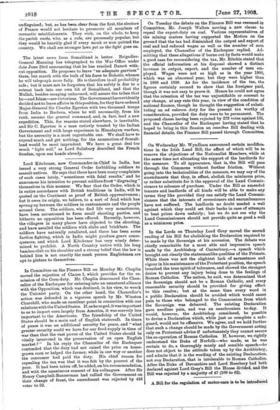In the Lords on Thursday Lord Grey moved the second
reading of his Bill for abolishing the Declaration required to be made by the Sovereign at his accession. The debate was chiefly remarkable for a most able and impressive speech made by the Archbishop of Canterbury,—a speech which brought out clearly the statesmanlike qualities of the Primate. While there was not the slightest lack of earnestness and vigour in his maintenance of the Protestant position, the speech breathed the true spirit of tolerance, and showed the strongest desire to prevent any injury being done to the feelings of Roman Catholics. The nation, he said, was determined that the Sovereign should not be a Roman Catholic, and every reasonable security should be provided for giving effect to this resolve; but at the same time every word in a public Declaration should be avoided which would cause pain to those who belonged to the Communion from which the Sovereign was debarred. The existing Declaration gave needless pain, and was an anachronism to-day. It would, however, the Archbishop considered, be possible to devise a Declaration which, while just as complete a safe- guard, would not be offensive. We agree, and we hold further that such a change should be made by the Government acting only on Protestant advice if unfortunately they cannot secure the co-operation of Roman Catholics. If, however, we rightly understand the Duke of Norfolk—who made, as he was certain to do, a thoroughly manly and sensible speech—he does not object to the attitude taken up by the Archbishop, and admits that it is the wording of the existing Declaration, not any Declaration, that is intolerable to Roman Catholics. After the Duke of Devonshire and Lord Rosebery had both declared against Lord Grey's Bill the House divided, and the Bill was rejected by a majority of 47 (109 to 62).






















































 Previous page
Previous page